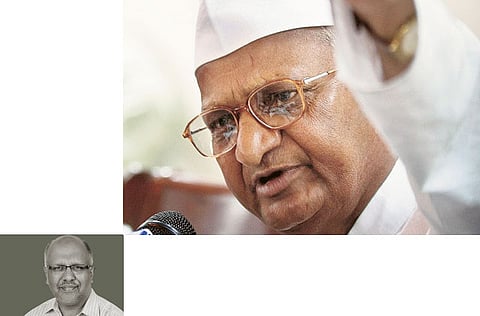Pakistan yearns for a ‘Hazare' too
The country's complacency-driven ruling elite has to learn some lessons from across the border

The crisis unleashed by anti-corruption protests targeting India's graft-tainted government offers many lessons for Pakistan. While public rallies in India have lifted the credentials of the 74-year-old veteran campaigner, Anna Hazare, Pakistanis have watched the situation across the border with much interest.
Pakistan is no stranger to corruption in high places. Scandal after scandal involving senior politicians, high-ranking officials and other prominent individuals have become public, underlining the nature of the beast. While there have been high-profile arrests in the past, Pakistan tragically has a poor history when it comes to successful prosecution and sentencing.
Across the country, however, there is widespread popular lament over graft being more than just a mere fact of life. Calls for a revolution come frequently from ordinary Pakistanis, notably those who consider themselves disempowered and marginalised.
In recent days, TV coverage in Pakistan of the anti-graft campaign in India appears to have vividly illustrated the way that events in Delhi have struck a chord across the border. For long, Pakistanis have waited for a messiah but to no avail. Today, the yearning for such a deliverer from corruption appears to be much stronger than ever before.
To make matters worse for the country, Pakistan's ruling class appears to show no signs of responding to the challenge posed by corruption in high places. Unlike India where a veteran campaigner in his 70s has become the lightning rod for popular opinion and has inspired the public at large to take the cue from him, there is no similar individual who has become a comparable figure in Pakistan.
But like India, Pakistan's ruling politicians including members of the country's parliament have seldom considered corruption an important enough issue to be vigorously discussed and debated in parliament. Ironically, for a country where politicians are keen to note the importance of strengthening the evolving democratic framework, it is important to recognise the equal if not greater significance of aggressively battling corruption.
Politicians in Pakistan appear to give no heed to corruption as an issue of vital significance. But what is even more disturbing is indeed the fact that questions raised on the conduct of politicians in relation to impropriety are quickly shoved under the carpet as if they were an attack on democratic values.
In this background, the time has now come for Pakistan to recognise the overwhelming significance of fighting corruption, not just for the country's overall well-being but also for its ability to sustain its still young democratic order.
Abject poverty
If Pakistan continues to become an even more tainted country where values related to clean governance remain subservient to so-called discussions on democracy and civilian rule, sustaining the latter may remain an uphill task. While reverting to military rule as has been the case in Pakistan's history may not be an option, it can be stated with a significant degree of certainty that chaos will increasingly become a fact of life going forward.
The popular yearning for an end to corruption coincides with what appear to be difficult economic times for Pakistan. The country's elite have neglected the poorest of the poor for too long.
At least a third of Pakistan's population, or by some accounts even a higher proportion, continues to live below the poverty line. This essentially means that a large segment of the country's population, which on its own may be larger than the entire population of many countries, lives in extreme and abject poverty, facing conditions that can simply not be imagined by the ruling elite.
The missing element for now may indeed be that Pakistan has yet to discover a prominent individual like India's Hazare who becomes the hope for the country's downtrodden and those in need. Given the desperation felt by many Pakistanis, it is possible that such an individual may be found sooner or later, who then leads calls for a long-overdue change.
The consequences of such an eventuality may be difficult to comprehend at the moment. But given the popular yearning for an abrupt change, it is more than likely that such a change could be tumultuous and even possibly bloody. The easier option for Pakistan's complacency-driven ruling elite which they are unlikely to embrace going by past precedent, is simply that of learning a lesson from events across the border. The ‘Hazare factor' in India's landscape is a breath of fresh air.
Farhan Bokhari is a Pakistan-based commentator who writes on political and economic matters.


